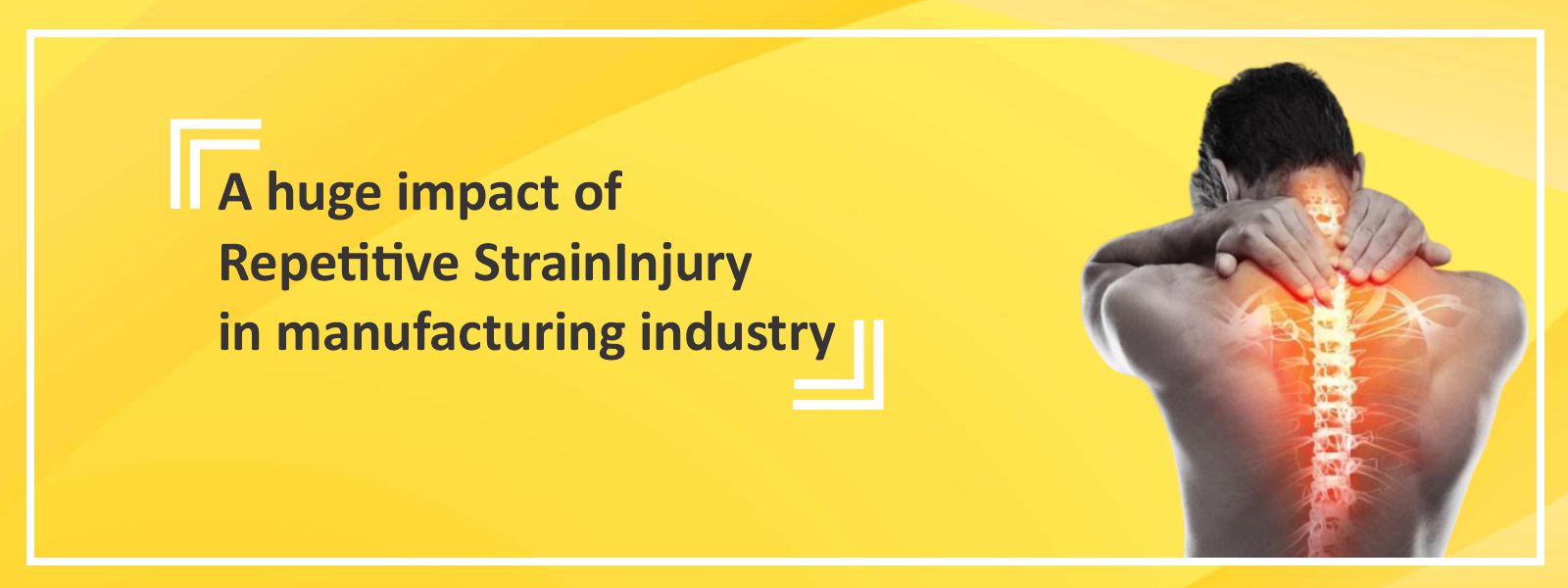
A huge impact of Repetitive Strain Injury in manufacturing industry
Repetitive Strain Injury (RSI) is a generic term and often used to describe work-related musculoskeletal disorders. RSI is an umbrella term used to describe a number of specific musculoskeletal conditions, i.e., as Carpal tunnel syndrome (CTS) well as ‘diffuse RSI’, which is more difficult to define.
These conditions are often occupational in origin. Lack of adequate diagnosis or access to appropriate treatment can bring the conditions and sometimes leads to job loss and economic hardship.
RSI is the more commonly known term for a set of disorders called Work Related Upper Limb Disorders (WRULD’S). RSI covers a wide range of injuries to muscles, tendons and nerves. Usually hands, wrists, elbows or shoulders are affected but knees and feet may also suffers especially if a job involves a lot of kneeling or operating foot pedals on equipment.
The highest percentage of work injuries resulting from repetitive motion occurs in the manufacturing sector, where assembly-line works are common (Keller et al.,1998) RSI’s must be treated at an early stage or a permanent disability could be caused which can cause a loss in term of compensation, productivity and number of working hours/days . Signs and symptoms vary, depending on type of jobs and which part of the body is affected.
Initially, symptoms may only occur when the individual is doing the repetitive task – they will slowly go away when the person rests. Eventually, though, symptoms may be present all the time, if left untreated.
The most common RSI signs and symptoms include: Tenderness in the affected muscle or joint, Pain in the affected muscle or joint, A throbbing (pulsating) sensation in the affected area, Pins and needles (tingling) in the affected area, especially the hand or arm, Loss of sensation in the hand, Loss of strength in the hand, Weakness, lack of endurance
RSI is caused, by continuous repetitive and forceful work, hand or arm movements, i.e. hammering pushing, pulling, lifting or reaching movements, too fast or extreme workloads, long hours, lack of variety or breaks, awkward grips or positions, imperfectly designed equipment and/or poor working environments. Other synonyms for RSI include: Cumulative Trauma Disorder (CTD), Occupational Overuse Syndrome (OOS) and Repetitive Motion Syndrome (RMS).
The more specific disorders are CTS, Tendonitis, Tenosynovitis, Dupuytren’s contracture, Epicondylitis or ‘tennis elbow’, Bursitis and a host of others. Of course, CTS is the most common problem brought on by repetitive hand motion in industries
The information revealed awareness of impact of the RSI . Below are the recommendations for preventing RSI symptoms occurrence amongst the industrial workers.
- A continuous check on the critical limits of the risk factors analyzed has a good prospect in reducing the RSI occurrence.
- There are number of fitness techniques, which can include simple lifestyle changes to help ease An employee health awareness and evaluation program particularly for RSI related disorders (mostly neglected in manufacturing) can be implemented
- Yoga – the practice of postures, stretches
- Swimming
- Tai chi – a mind and body discipline of choreographed movements to restore body’s harmony relaxation technique such as meditation



